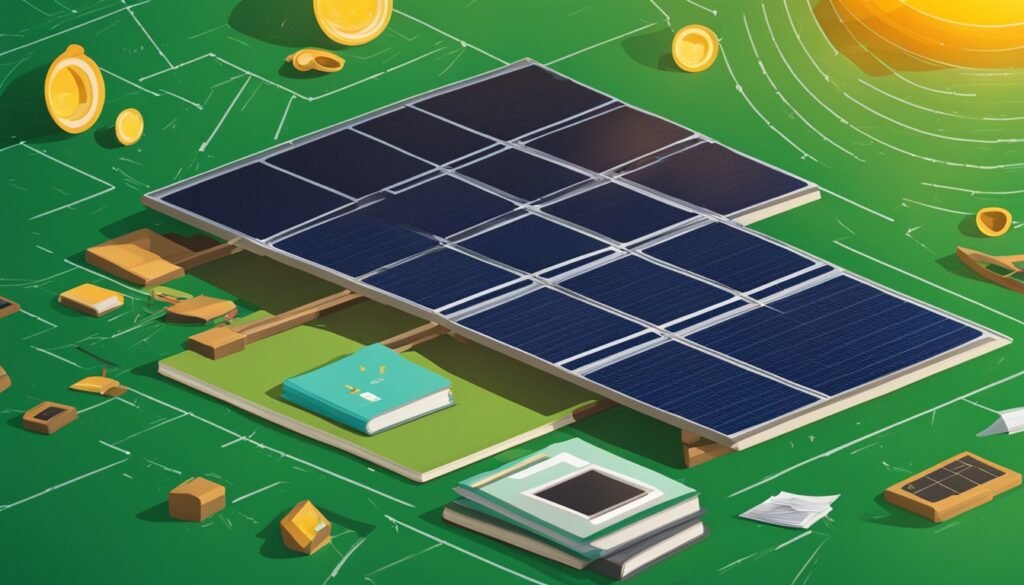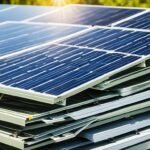Struggling with the solar panel passage on the TEAS exam? Wondering if there’s a simpler way to find the answers? You’re not alone. Many students aiming for a career in health sciences find this part tough.
Our detailed article offers deep insights and study tips for the TEAS exam. It especially focuses on the solar panel passage by Chegg. Grasping these ideas is crucial. Not just for the exam, but for keeping pace with the fast-evolving renewable energy sector.
Let’s dive into the secrets of the solar panel passage. We aim to make your exam preparation easier and more productive. Time to embark on your journey towards academic achievement!
Key Takeaways
- Gain insights into the TEAS solar panel passage with Chegg study solutions.
- Enhance your preparation for the TEAS exam with our expert tips.
- Understand the importance of this passage in the context of renewable energy.
- Acquire knowledge that applies to both academic and real-world sustainability questions.
- Achieve a better grasp of essential academic skills required for health science fields.
Introduction to TEAS Chegg Solar Panel Passage
The TEAS exam is key for those entering health sciences. It focuses on subjects like the solar panel study guide. This test checks if you’re ready for tough courses in nursing and health areas.
Importance of TEAS Exam
The TEAS is vital for future healthcare professionals. Scoring well shows readiness for hard academic programs. We aim to help you excel in the exam with our study materials.
Why Focus on Solar Panel Passages?
Learning about solar panels on the TEAS is important. It teaches about green practices and renewable energy tech. Knowing about solar panels is key as the world shifts to sustainable energy.
Understanding Solar Energy Resources
The world is moving towards sustainable actions, making it key to learn about solar energy resources. This knowledge, especially for the TEAS exam, helps us value and use renewable energy well.
Types of Solar Energy
Let’s look into the main types of solar energy:
- Photovoltaic Systems: These convert sunlight right into electricity through solar panels. They’re flexible and work in many places, from homes to big solar farms.
- Thermal Energy Collection: This technique warms a fluid with sunlight. The hot fluid then makes steam, which powers a turbine to create electricity. It’s great for making a lot of electricity and cuts down on fossil fuel use.
Benefits of Solar Energy
Solar power has several key perks:
- Sustainability: It’s a never-ending resource. Unlike oil or coal, it won’t run out. Using solar energy means we can meet our energy needs without depleting resources for future generations.
- Cost Savings: Solar setups, once in place, cost very little to keep up. This leads to major savings on energy expenses over time.
- Environmental Impact: It lessens greenhouse gas emissions and pollutants. This helps make our planet cleaner and healthier, showcasing solar power’s true value.
- Energy Independence: Solar energy allows communities to be less dependent on imported fuels. This boosts our energy security and makes us more resilient.
Knowing these solar power advantages not only gets us ready for exams but also raises our awareness for a sustainable future.
Renewable Energy Solutions for a Sustainable Future
Our path to a sustainable future includes many renewable energy sources. Let’s see how each one aids in making energy sustainable.
Different Renewable Energy Sources
There are various sources of renewable energy, each with its special strengths and uses. They cover:
- Solar Energy: This involves using solar panels and photovoltaic systems to catch the sun’s energy.
- Wind Energy: By using wind turbines, this type of energy converts wind into electricity.
- Hydro Energy: This method generates power from water movement in rivers and dams.
- Geothermal Energy: It uses the heat from beneath the Earth’s surface.
- Biomass Energy: This energy comes from turning organic materials into fuel.
Each renewable energy source brings its unique benefit to our energy mix. This diversity ensures a strong and varied way to generate power sustainably.
How Solar Power Fits In
Solar power is crucial in renewable energy for its availability and effects. It stands out because of:
- Abundance: The sun offers an endless supply of energy.
- Cost-Efficiency: Solar panel technology has become much more affordable.
- Scalability: It can be used for big power plants or small home setups.
- Environmental Benefits: It produces no emissions, keeping air and water clean.
By adding solar energy to our energy plans, we cut down on fossil fuel use. This move brings us closer to a future that’s sustainable and dependable.
Advancements in Clean Energy Technologies
Solar tech innovations are changing how we think about energy. These advancements make energy greener, more efficient, and cheaper.

Innovations in Solar Panel Technology
Bifacial solar panels are a breakthrough in clean energy. They capture sunlight from both sides, increasing energy output. Perovskite solar cells are also emerging. They’re more efficient and cheaper than traditional panels. These advances are making solar energy more available and efficient.
Impact on Energy Efficiency
New solar panel tech improves how efficiently we use power. By using smart grids and energy storage, we better distribute and use solar power. This boosts energy efficiency and cuts down on fossil fuels. Through these clean energy technologies, we are moving toward a sustainable world.
Solar Panel Installation Guide
Welcome to our solar panel installation guide. We’ll guide you through the necessary steps for installing your solar energy system. You’ll learn about the vital solar setup tools needed for an efficient setup.
Step-by-Step Installation Process
- Site Assessment: Begin by checking the location for the best sunlight.
- Design the System: Figure out your energy needs and plan a system to meet them.
- Mounting the Panels: Place the mounting brackets on the roof or ground, ensuring alignment.
- Install the Panels: Fix the solar panels onto the mounting structure.
- Wiring: Link the solar panels and the inverter with proper wiring.
- Grounding: Ground the system properly to meet safety and local rules.
- Connecting to Grid or Batteries: Connect the system with your home’s electrical network or batteries.
- Testing: Do thorough checks to make sure everything works well.
Essential Tools and Materials
Here are the essential solar setup tools and materials for a successful installation:
| Tool/Material | Description |
|---|---|
| Solar Panels | The key component for capturing the sun’s energy. |
| Mounting Hardware | Brackets and rails to fix panels to your roof or ground. |
| Inverter | Changes solar panel DC into usable AC for your home. |
| Wiring | Connects solar panels to the inverter and to the power system. |
| Grounding Equipment | Makes your installation safe and compliant with laws. |
| Tools | Needed for installation include a drill, screwdriver, wrench, and safety equipment. |
Choosing the Best Solar Panel Brands
Choosing the right solar panel is important. We’ll look at top brands and what makes them stand out. Also, we’ll consider what factors you should think about before buying.
Top Rated Solar Panels
Listening to experts and looking at reviews can help you choose. Some top solar panel brands include:
- SunPower: Known for its high efficiency and robust warranty.
- LG: Offers quality panels with sleek designs and great performance.
- Canadian Solar: Good performance at an affordable price.
- Panasonic: Loved for its durable and efficient panels.
Factors to Consider When Choosing
Think about brand reputation, panel efficiency, and warranty when choosing. These factors will help you select the best solar panels.
- Efficiency: This is how well a panel turns sunlight into power. Brands like SunPower and LG make panels that get more energy from less space.
- Warranty: A good warranty means less worry. For instance, SunPower offers up to 25 years of coverage.
- Company Reputation: Looking into a company’s history and reviews ensures you get top-notch panels that last.
Let’s look at a comparison of some leading solar panel brands:
| Brand | Efficiency | Warranty | Reputation |
|---|---|---|---|
| SunPower | 22.8% | 25 years | Top-tier |
| LG | 21.1% | 25 years | Top-tier |
| Canadian Solar | 20.0% | 12 years | Reliable |
| Panasonic | 19.7% | 25 years | Top-tier |
Understanding these factors helps us choose the right solar panels for our needs and budget.
Energy Efficiency Tips to Maximize Solar Power
Getting the most from our solar power system means taking some smart steps. These energy efficiency tips can save us a lot of energy and money. They also help our planet by supporting sustainable energy practices.
Putting solar panels in the right spot is key. They do best in sunny spots, facing south if you’re in the Northern Hemisphere. This way, we’re maximizing solar power and making more energy.
Keeping the panels clean is also important. Doing this stops them from losing energy. Choosing high-quality, efficient panels makes a big difference too. They generate more energy during their life.
Using less energy at home also helps. This is where energy-saving appliances and smart home tech come in. They lower how much energy we need, letting us maximize solar power benefits.
- Optimize Panel Placement: Place panels where the sun hits most to up energy capture.
- Regular Maintenance: Clean panels to keep them running well.
- Invest in Quality Panels: Better panels mean more energy.
- Energy-Efficient Appliances: Smart systems cut down energy use.
Let’s look at how different energy efficiency tips can boost solar power use:
| Action | Benefit |
|---|---|
| Optimize Panel Placement | More solar energy is captured |
| Regular Cleaning | Keeps panels efficient |
| Quality Panels | Increases energy over time |
| Energy-Efficient Appliances | Lowers how much energy we use |
By using these suggestions, we can boost our solar system’s efficiency. This saves more energy and supports sustainable energy practices every day.
Using Chegg Study Materials for TEAS Exam Preparation
Starting our TEAS exam prep with Chegg study materials is a smart move. Chegg offers a wide range of educational resources. These include everything we need to know for the TEAS exam, even the solar panel passages. This detailed prep makes sure we’re ready to do our best.

Chegg’s platform has interactive features and easy-to-understand explanations. These help make tough topics simpler, making our study time more effective. By using Chegg, we get to work with quizzes, flashcards, and videos. This diversity supports different ways of learning.
Chegg study materials improve our TEAS exam prep in the following ways:
- Comprehensive Coverage: Chegg covers a wide array of topics. This ensures we’re prepared for anything on the TEAS exam.
- Interactive Learning: Using interactive tools keeps us engaged. It also helps us remember what we learn better.
- Expert Guidance: With in-depth explanations from experts, we can clear up any confusion. This leads to a greater understanding.
For the best results with Chegg study materials, we need a good study plan. This should include breaks and different study methods. Here’s a sample plan for a week:
| Day | Activity |
|---|---|
| Monday | Review solar panel passages, take notes |
| Tuesday | Complete related practice quizzes on Chegg |
| Wednesday | Watch instructional videos on key concepts |
| Thursday | Engage with flashcards for quick recall |
| Friday | Join study groups for discussion |
| Saturday | Revise notes and take a full-length practice test |
| Sunday | Rest and reflect on progress |
Adding Chegg study materials to our routine helps a lot with TEAS exam prep. It not only gets us ready for tough topics like the solar panel passages but also boosts our confidence. With Chegg’s wide range of educational resources, we can fill in any knowledge gaps. This improves our odds of doing well on the exam.
Conclusion
Understanding solar panels for the TEAS exam is crucial for your studies and helps you learn about renewable energy. In this article, we stressed the importance of knowing the solar panel section from Chegg. It prepares you for the exam and gives insights into an important science field.
The article started with what the TEAS exam involves, focusing on solar panel passages. It discussed the types of solar energy and its benefits. We also talked about how solar power is part of sustainable development.
Next, we talked about new technology in solar panels and how it improves energy efficiency. We also provided practical advice on installing solar panels and picking the best brands. This information is useful beyond just learning for an exam.
Using Chegg’s study materials is a great way to get ready for the TEAS exam. We summarized key points to help highlight the value of understanding solar panel topics. Good preparation strategies can lead to exam success and a deeper interest in sustainable energy.





